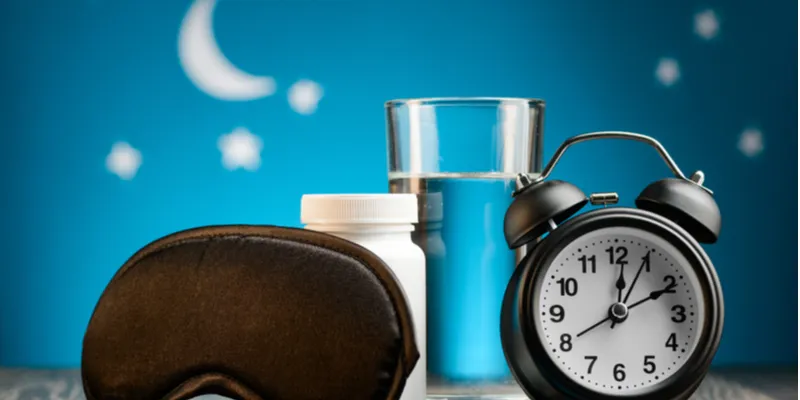Are you sleep-deprived? Here’s how a healthy diet can promote deep slumber
Millions of people worldwide take prescription drugs to fall asleep. But following a nutritious diet can be the first and best step you can take for a good night of sleep, says our nutritionist
Did you know that from 1942 to 2013, the number of hours of average sleep went down by 13-15% and more than 70 million people suffer from some form of sleep disorder?
This number could be alarmingly more in areas that we do not know and it continues to rise by the day. It has also been observed that 90% of those suffering from chronic sleep deprivation have a greater risk for chronic health challenges.
Millions of people worldwide take prescription drugs to fall asleep and and can get addicted to them. Sleep is the missing piece in healthcare nowadays, for sure. It’s just not being given the attention that it needs. How often have you ignored poor sleep and managed somehow?
Don’t ignore insomnia

Insomnia is a global problem
During times of stress, sleep can be deeply impacted and poor sleep can make you more stressed than you were before.
Sleep is also connected to weight gain. You might find that despite making many changes to your diet, your weight just does not budge. Having one night of poor sleep can increase ghrelin, which is the hunger hormone, and reduce leptin, the satiety hormone.
This means that you will reach for more food, and the wrong kinds of food, after poor sleep. You will not even realise it when you do so! Lack of proper sleep is something that just cannot be ignored. You can go longer without food, but not without sleep.
Foods to avoid if you struggle with poor sleep
- Chemicals and chemical sweeteners (Diet Coke, aspartame, sugar-free snacks, mints).
- Avoid sugars as much as you can. This is an opportunity to do a sugar detox as well.
- Avoid using plastic containers, reheating food in the microwave and cooking in any aluminum vessel.
- Avoid all gluten, from wheat, oat, rye or barley, pasta, bread, noodles, as well as in sauces and dressings.
- Avoid dairy except for ghee and yoghurt. Restrict cheese.

Avoid caffeine and alcohol close to bedtime
- Limit coffee and alcohol. If you do require your coffee, have it after your breakfast and avoid it beyond the morning.
- Avoid eating oily and heavily spiced foods.
- Avoid all processed and canned foods. Eat whole foods only.
- Avoid most sweeteners except for natural fruit, stevia, raw honey and coconut sugar.
Food to include if you struggle with poor sleep
- See that every meal has fat, fibre and protein.
- Include ample protein at each meal, whether you are an omnivore, vegetarian or vegan.
- For carbohydrates, include complex ones with fibre, over simple sugar and starches.
- Include healthy fats at every meal. Avoid low fat diets.
- Include plenty of vegetables and try to include those that you have not in a while.
- Choose fruits as a snack between meals. Avoid fruit beyond 4 pm
- Eat more green pumpkin seeds, cashew, sesame seeds and walnuts.
- Cook with spices such as turmeric, cumin, nutmeg, poppy seeds, fenugreek and saffron.
- Eat more dark chocolate and raw cacao.
- Avoid most sweeteners except for natural fruit, stevia, raw honey and coconut sugar.
Nutrients that you require to ensure good sleep
A good multivitamin can support your body through the stressors it faces and can support and correct any deficiencies of trace minerals from a diet which might have been restrictive or from the years of damage that lack of sleep might have created.
Magnesium is one mineral that is used for hundreds of functions in your body and can easily become deficient from extreme stress and a poor diet. Vitamin B6 supports energy production, as well as the production of adrenal hormones. It also supports liver detoxification and enhances REM sleep.
Omega-3 is an essential fatty acid, which is required as part of your diet. It not only supports brain health but is also anti-inflammatory. It helps overall inflammation, and supports brain health, leading to a healthy HPA axis and well supported adrenals.
Create a nighttime routine

Nighttime rituals can help you fall asleep faster
Have a warm bath before your dinner. If you do have the luxury of a bathtub, soak for half an hour in a warm bath with Epsom salt and essential oil of lavender. Let your tight muscles relax from deep within and allow it to decompress the stress of your busy day.
Take time to nurture and pamper yourself! Eat a meal full of sleep supportive vitamins and minerals after a warm bath. Get enough magnesium, vitamin C, iron and calcium from food. Set an electronics curfew every night. Every hour of blue light exposure after dark reduces melatonin for half an hour! Set a two hour window before bedtime with no exposure to blue light.
Go to bed at the same time every day to set your circadian rhythm. Wake up at the same time everyday even the weekend. Put the lights out! Go back to eating in candlelight! Reduce exposure to artificial light when it is dark. Read a book which is calming and soothing to your brain. Avoid excitement or aggression at night!
Your main goals should be eating balanced meals that have fat, fibre, protein and colour, and maintaining routine with the earth. Those two changes alone can be profound in improving your sleep!
The sleep whisperer
If you need in depth information on sleep nutrition and lifestyle, tune into the Sleep Whisperer podcast which is weekly and available on all podcast apps. You can get a lot more information at https://directory.libsyn.com/shows/view/id/sleepwhisperer. As a yoga therapist for over two decades and a functional nutritionist too, I practise nutrition, based on the principles of functional medicine.
The Sleep Whisperer podcast created by me is a vision to bring guests from all over the world, to speak about root causes of sleep deficiency and different perspectives on the subject. It also gives you a better understanding of nutrition and cooking for better sleep, explores sleep therapies and so much more. With so much changing, it’s very important that we prioritise sleep above everything else during this time.
(Images credit: Shutterstock)
Edited by Asha Chowdary
(Disclaimer: The views and opinions expressed in this article are those of the author and do not necessarily reflect the views of YourStory.)









